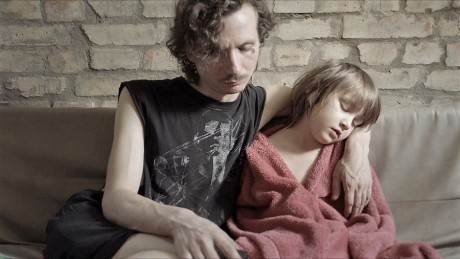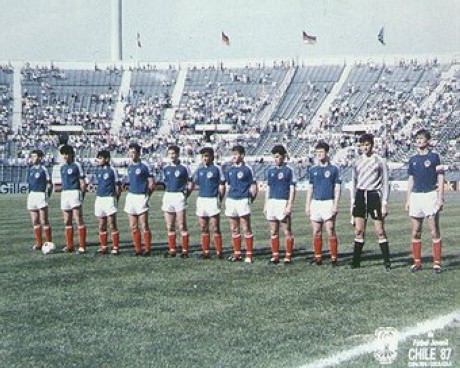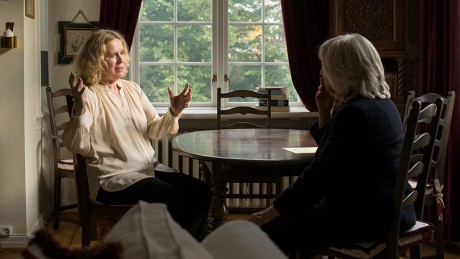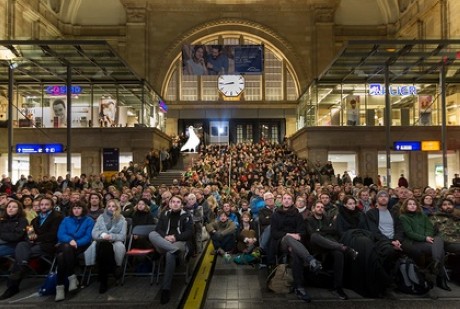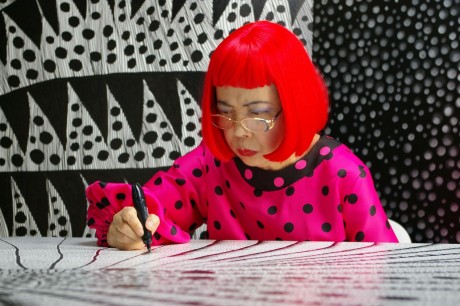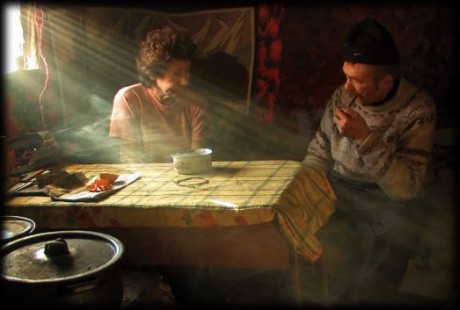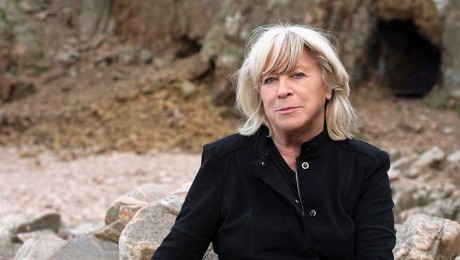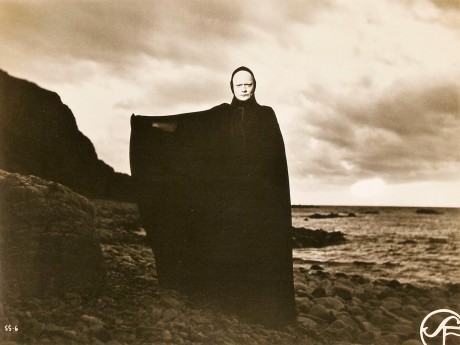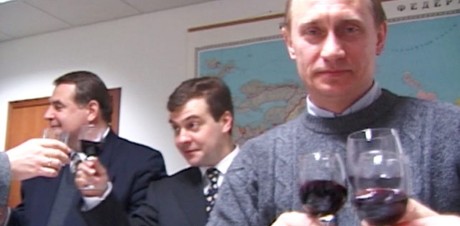MARGARETHA VON TROTTA: SEARCHING FOR INGMAR BERGMAN (2)
Forrige blognotat sluttede: “… Margarethe von Trotta folder sine hænder netop som jeg ser Max von Sydow gøre, med håndfladerne mod hinanden: ”Først meget alvorligt, men så mærker man, at han nok ikke kan bede så intenst som han gerne ville, vi forstår senere i filmen hvorfor. Så rejser han sig igen og i en lang optagelse går han tilbage til dette sted, hvor vi allerede havde set skakbrættet. Han går ud af billedet og kameraet panorerer til skakbrættet med den sorte klippe i vandet i baggrunden som et advarselstegn. Dønninger vasker over skakbrættet som udviskes. Og så viser en sort skikkelse sig: Max von Sydow ser op: ”Hvem er du?” Anders Ek: ”Jeg er døden.” Max von Sydow: ”Kommer du for at hente mig?” Anders Ek: ”Er du beredt?” Max von Sydow: ”Min krop er beredt, ikke jeg selv.”
Og jeg kan nu vælge at se von Trottas vidunderlige film med Bergmans mesterværk parallelt i tanken…”
KONTRAPUNKT
Og det kan så nu igen lade sig gøre. I Cinemateket i København torsdag 18. oktober hvor filmen vises første af fire gang som månedens film. Og om denne særlige manuskript-parallelitet er jeg siden kommet på dette citat om manuskripttilblivelse i en bestemt af de nye franske film som von Trotta i det følgende afsnit fortæller hun i sin ungdom opsøgte i Paris:
“… Alain Resnais bad Marguerite Duras om at skrive manuskript til en fiktionsfilm, efter at han var gået i stå med en dokumentarfilm om atombomben. Han foreslog hende filmens struktur, nemlig at en nutidig kærlighedshistorie i Hiroshima skulle gribe tilbage til begivenheder i Frankrig under den tyske besættelse, men han understregede samtidig, at han ikke ønskede et traditonelt filmmanuskript. Han bad hende tværtimod om at udforme manuskriptet, som om det var en roman, eller som om hun skulle ’kommentere billederne i en film, der allerede er optaget’. Med udgangspunkt i hendes tekst ville han derpå skabe en lyrisk billedside, der forholdt sig kontrapunktisk til ordene.” (Christian Braad Thomsen)
FILMKUNST
Margarethe von Trotta slår det fast med det samme, hendes nye film Searching for Ingmar Bergman handler om filmkunst; og så handler den om hendes møde i sin ungdom med Bergmans cinematografi, allerførst Det syvende segl, som hun så i Paris hvor hun som nævnt opsøgte den nye bølge og opdagede disse franske instruktørers glæde ved Hitchcocks metode, og ved siden af den Bergmans særlige stil.
Det er nu i dette filmessay Bergmans arbejde hun undersøger, og hun gør det beslutsomt og roligt. Hun tager udgangspunkt i sit eget udgangspunkt og lader sit eget arbejdslivs erfaring i tilbageblikket på Bergmans gå i dialog med vidne efter vidne, kender efter kender af det værk og baggrunden for dets tilblivelse.
Det bliver til dejligt lange dybt interessante interviews som alle står som filmscener klippet i samtalens blidt langsomme rytme, fotograferet i ophøjet ro i det ene stilfærdige og ærlige set up efter det andet. I et kontrapunktisk system, måske en cinematografisk fuga skydes dels de meget smukke klip med citater fra Bergmans film, dels de tætte billeder fra hans privatarkiv, dels andet arkivmateriale fra aviser og tv (især et par enkelte steder, hvor det måske forstyrrer lidt, tror jeg) ind i forløbet og ligger så ligesom melodistemmer ved siden af samtalernes fremadskriden i egne forløb og variatoner; og dette, filmklipperens og instruktørens fortællelag, som er det vigtige og som direkte udbygger filmens emne, det kunstneriske arbejde, mens især de dokumentariske optagelser fra indspilningerne tydeligt illustrerer eller rettere demonstrerer mesterens metode, hans ganske særegne samarbejde med skuespillerne, som han knytter tæt til sig i største respekt for deres kunst.
EMPIRI
Filmens to emner, som således for det første er filmkunsten og for det andet er dens levende krop, oplever jeg på den måde at det andet emne i sit empiri så at sige belyser det første og funderer dets skildring af Bergmans poetik.
Den første samtale von Trotta opsøger er næsten naturligvis et møde med Liv Ullmann. Hvad er det så der sker med denne lange filmscene, hvor hun er medvirkende vidne? (STILL ovenfor) Er dens emner så det kunstneriske og skuespillerens arbejde? Hvad er det der sker med mig undervejs? Jo, sandelig, jeg vokser i et nyt kendskab til dette menneske, denne centrale kvinde i Bergmans værk, som ung og gammel, i et arbejde med rollen som har haft mange navne, senest Marianne i Sarabande, 2004, Jenny Isaksson i Ansigt til ansigt, Eva i Høstsonaten, i Marianne i Scener fra et ægteskab, Maria/Marias mor i Hvisken og råb, Anna Fromm i En passion, Eva Rosenberg i Skammen, Alma i Ulvetimen og allerførst i 1965 Elisabet Vogler i Persona, hvor hun stum i et tæt kammerspil, en “sonate for to” med Bibi Andersson i den anden rolle, er i billedet hele tiden og mod slutningen har denne eneste replik ”Ingenting”.

Liv Ullmann og Ingmar Bergman under indspilningen af Persona
Hvis du skal se én film om Bergman må det være Margarethe von Trottas Searching for Ingmar Bergman. For den handler om hans kunst og egentlig kun det:
https://www.dfi.dk/cinemateket/biograf/filmserier/serie/manedens-dokumentar-i-oktober-searching-ingmar-bergman
(Cinematekets Margarethe von Trotta program)




